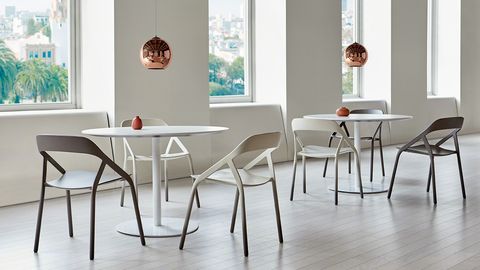You can't please everyone. Especially after a room renovation.
Some months ago we got an e-mail saying that both our big meeting room and social room would face some renovations, aside from the fact that they would exchange places: While the social room was in the ground floor, the meeting room was right above it and had a door to the terrace. The exchange made sense, especially in the warmer days when we could just “extend” the social room with the terrace. And a quick access to the meeting room from the ground floor would be more than welcome.
After some delay, both rooms were finally ready-ish. But we knew it wasn't 100% because we got an e-mail explaining everything what we should know: There were unexpected problems that caused the delay, the rooms are in a “minimum viable product” state and that we would be missing a couple of things.
For context:
- The old social room had a dark grey carpet, 2 couches, a small library with technical books and plenty of chairs around a big improvised table made from smaller tables. There was a small kitchen outside, but next to the room. Thanks to the dark tone of the carpet and the only 2 windows as natural source of light, the room always seemed dark. It kinda looked like a meeting room with some social cues.
- The new social room, however, has a white-ish floor (no carpet), no library (I don’t know where it is), plenty of chairs close to plenty of smaller tables spread around the room. Since we got more space, the kitchen was moved inside. And now we have more sources of natural light as we have a door and a big window to the terrace. Now it feels we are getting into a café with open kitchen.
Let me be clear: I fully support this kind of change. There is more light, more energy, and more possibility to roam and talk to different groups. It may still lack some things but the potential is enormous!

Looking at the business side of the story, the company took all necessary steps. Including:
- Acknowledge that we would be in a bumpy ride. Especially with meetings, breakfasts and the usage of the coffee machine.
- Explain people what we got and what was missing. The message that there would be more work (decoration) was clear.
Still, some people were not happy.
I heard a lot of different things from random people in random conversations. Mostly ranging from “the room is not even finished” (we knew) to “this is an anti-social room”. And those were not just people pointing out issues, which would be relatively normal. They were real complaints. And every complaint had a comparison with the old social room.
It seemed personal. Most likely from a very loud minority.
I know that some people have hard time to cope with changes, especially at work. But this is getting ridiculous. I am talking about rooms that we wouldn’t spend more than 6h per week in the average. Some of us, really only go there to grab a cup of coffee or some fruits and leave.
I were responsible for the changes I would probably try to:
- Send an e-mail explaining the line of thought for the changes and opening a communication channel for whoever wants to make suggestions.
- Get the unsatisfied people and talk individually with them. It should be easier to dissuade some of the random complaints when having a 1-1 dialog.
- Enlist the people who insist on the complaints to help to solve the issue – either by moving stuff, assembling furniture or painting the walls (if needed, who knows)
That’s all.
As empathetic as I am trying to be, I still think it’s too much crying for much welcome changes. But if everything is open source these days, why not room renovation?
